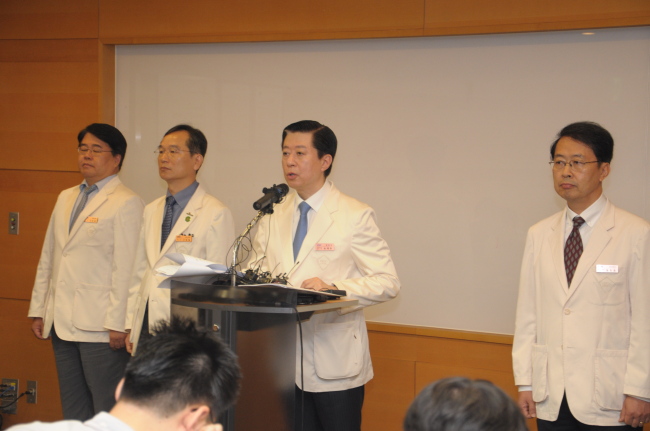Samsung Medical Center, a top hospital known as the largest infection source of the recent Middle East respiratory syndrome outbreak, vowed Wednesday to invest 100 billion won ($84.7 million) to revamp its emergency facilities and come up with vaccines for the virus as part of its post-MERS plan.
Ninety-one people were reported to have contracted the virus at the hospital in Seoul, accounting for 49 percent of all confirmed cases in the country. Most of the patients were infected at the hospital’s emergency room, where the 14th confirmed patient, who was considered a “super-spreader,” stayed from May 27-30.
In its effort to avoid repeating the same error, the hospital plans to renovate and expand the size of its emergency room by March of next year.

Song Jae-hoon (second from right) speaks during a press conference in Seoul on Wednesday. (Samsung Medical Center)
“Once completed, the facility will be 1.6 times bigger and will have six separate units including ones for cancer patients and those with contagious diseases,” said Song Jae-hoon, director of the hospital.
Song also said the hospital will house more than 20 negative air pressure rooms that prevent cross-contamination by next year. Of them, 11 rooms will be installed inside the emergency room, the SMC added.
The rooms require using a special ventilation system that produces negative pressure to make sure air flows into the isolation room for infected patients, but does not escape from the room.
While the system is normally used to quarantine patients with airborne contagious diseases such as tuberculosis, the hospital did not have any such rooms installed prior to the MERS outbreak.
The hospital, which is run by the Samsung Group, also announced its plans to donate 41 billion won to the International Vaccine Institute, an initiative of the U.N. Development Program based in Seoul, to help find a vaccine and cure for the MERS virus over the next five years.
The SMC also announced that all patients who arrive at the emergency unit will be treated by specialists, instead of resident doctors or interns.
In order to prevent the emergency room from getting overcrowded, the hospital is coming up with a new system where each and every patient can receive their emergency treatment in the first 30 minutes upon their arrival, and either get hospitalized for further treatment or released from the facility within six hours.
Korea’s current hospital system, in which family members provide basic care normally carried out by nursing staff in other developed nations, has been largely blamed for the MERS spread, which has claimed 36 lives since May. Many Koreans contracted the disease while caring for or visiting their family members at MERS-affected hospitals including the SMC.
To tackle the issue, the hospital announced that every inpatient will now only be allowed to be cared for by a single family member during the hospital stay, and all caretakers must be registered before they arrive at the facilities. Non-registered members will be banned from entering the property, the hospital added.
The Health Ministry had refused to share the list of MERS-affected hospitals, including the SMC, for more than two weeks after the index case was confirmed in May. The government had been accused of protecting commercial interests of the hospitals by not sharing the information, rather than keeping the general public safe from the possible infection.
After public criticism mounted on the SMC, the heir of the Samsung Group, Lee Jae-yong, made a bow of apology on national television on June 23.
By Claire Lee (
dyc@heraldcorp.com)





![[KH Explains] How should Korea adjust its trade defenses against Chinese EVs?](http://res.heraldm.com/phpwas/restmb_idxmake.php?idx=645&simg=/content/image/2024/04/15/20240415050562_0.jpg&u=20240415144419)
